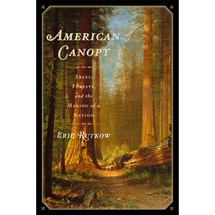It's always interesting to examine the large and familiar through the lens of the small and unexpected. This is what made
Mark Kurlansky's Cod so exciting: It revisited the history of the world through the harvesting of these large, white-fleshed fish. In
American Canopy, first-time author Eric Rutkow views the discovery, survival and rise of the United States as a function of its trees—trees used to build royal masts for royal English ships, trees used to build turn-of-the-last-century rails across America, trees that did not catch fire during World War II, despite Japanese air balloons sent to do just that. In each case, trees are the resource that defines the economy, politics, culture and even national identity.
His argument is interesting, of course (who doesn't love trees?). But it's Rutkow's eye for storytelling that keeps even those who don't normally read histories zipping through the pages. The book begins with a heartbreaking account of one of the world's oldest trees, a bristlecone pine that lived almost 5,000 years, "an organism already wizen when Columbus reached Hispaniola, middle-aged when Caesar ruled Rome, and starting life when the Sumerians created mankind's first written language," which was chopped down in 1964 because a grad student couldn't figure out how to examine its rings. Plenty of other tree lore is debunked and detailed: Washington's love, not of cherry trees, but of dogwoods and sassafras on his Mount Vernon estate; Johnny Appleseed's (nay, John Chapman's) cultivation of orchards for alcoholic ciders, not apples; Benjamin Franklin's efforts to save trees with the invention a super-efficient woodstove that no one used, preferring the huge (read: 4 by 8 feet) stone hearths of the day which "lost about 90 percent of the heat out the chimney"; FDR's failed attempt to transform the Great Plains into a forest. But equally fascinating and certainly more moving are the words of lesser-known folk like the 16th-century Englishman Richard Hakluyt, who saw the potential of such a resource, even if he was never able to make it across the ocean to see "the sweet woodes ... and divers other kindes of goodly trees" of the soon-to-be colonized New World.


